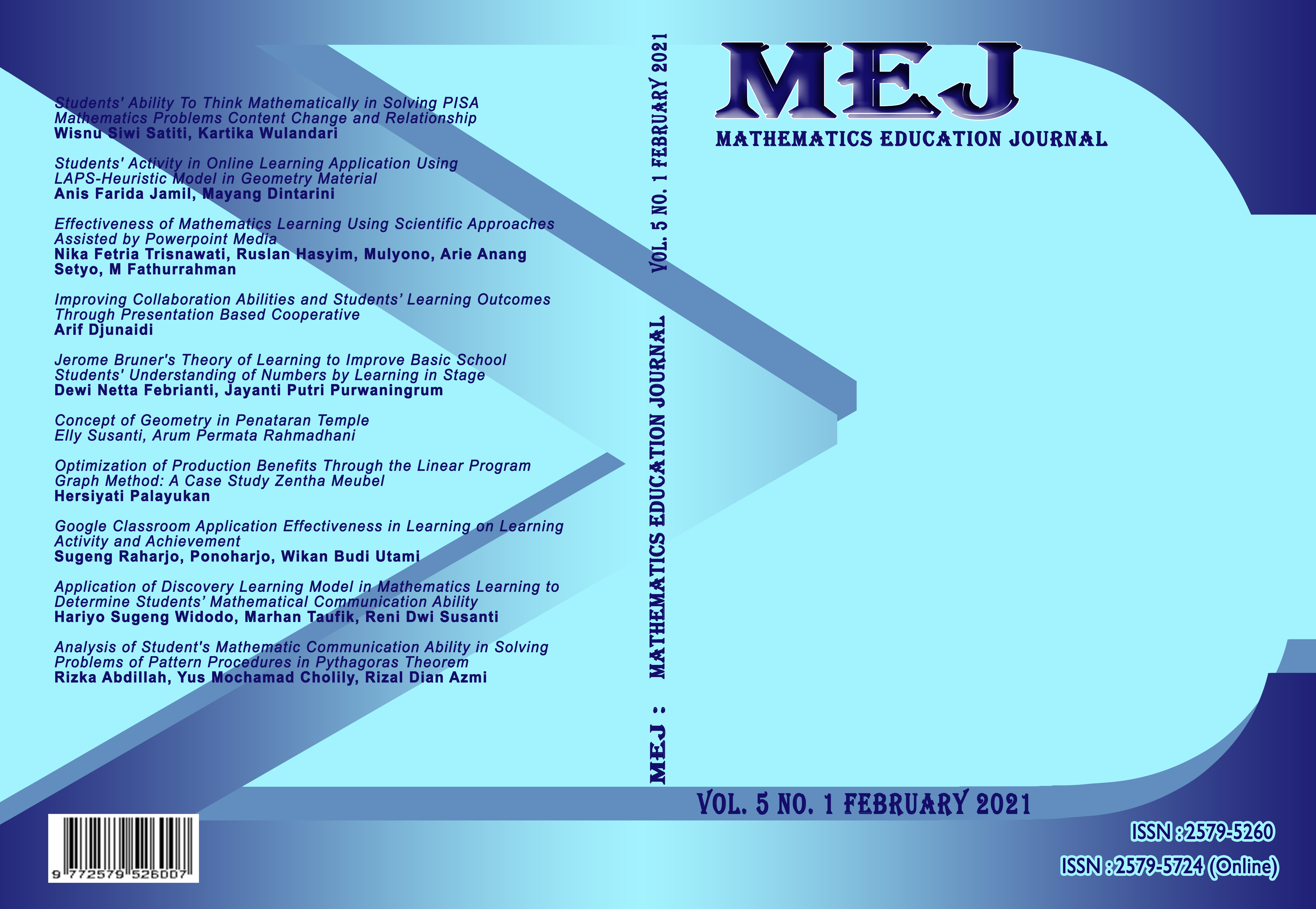Google Classroom Application Effectiveness in Learning on Learning Activity and Achievement
DOI:
https://doi.org/10.22219/mej.v5i1.13335Keywords:
Efektifitas, Aplikasi Google Classroom, Keaktifan, Prestasi BelajarAbstract
The purpose of this study is to describe: (1) whether the learning achievement using the google classroom application reach the KKM target beyond 55%. (2) whether the google classroom application can improve student learning achievement. (3) how active students are in using the google classroom application. The data collection methods used were tests, observation, and documentation. The research population was the students of class XI. The research sample was XI IPA 3. The sampling technique was purposive sampling. The results showed that: (1) The learning achievement that were taught using the google classroom application, whose value exceeds the KKM is more than 55%. (2) The learning outcomes of students taught using the google classroom application are better with students who are taught using direct learning. (3) The level of active learning of students using the google classroom application is good.
Downloads
References
Susongko, p. (2017). penilaian Hasil Belajar. tegal: badan penerbit Universitas Pancasakti Tegal.
Darmawan, Y. (2020). Penggunaan Aplikasi google classroom dalam upaya meningkatkan hasil Belajar Matematika Pada siswa kelas X SMA Jurusan IPS.
Denis Purnama Sari, R. R. (t.thn.). Peningkatan keaktifan dan Hasil belajar siswa kelas XI IPS 2 SMA NEGERI 1 Turen Pada Pokok Bahasan Turunan dengan pembelajaran TGT.
lestiawan, F. (2018). PENERAPAN METODE PEMBELAJARAN EXAMPLE NONEXAMPLE UNTUK MENINGKATKAN KEAKTIFAN DAN HASIL BELAJAR DASAR-DASAR PEMESINAN . jurnal taman vokasi, 98-106.
Rasyid, A. P. (2015). Rasyid, A., Passaribu, M., & Pengaruh Model Pembelajaran Kooperatif Tipe Nht (Numbered Heads Together) dan Kemampuan Awal Terhadap Hasil Belajar Siswa Pada Mata Pelajaran Fisika Di SMP Negeri 2 Poso. mitra sains, 3.
Sugiawan, R. N. (2014). "Meningkatkan Aktivitas dan Hasil Belajar Matematika Melalui Pembelajaran Kooperatif Tipe NHT." . Jurnal Pendidikan Matematika Unila2.3
Sugiawan, R. N. (2014). Sugiawan, R., Nurhanurawati, N., & Meningkatkan Aktivitas dan Hasil Belajar Matematika Melalui Pembelajaran Kooperatif Tipe NHT. jurnal Pendidikan Matematika unila.
Yeskel, Z. (2014). "More teaching, Less tech-ing: Google Classroom Launches Today".. 12 agustus 2014
Yunita, T. (2018). Kefektifan Model Pembelajarn Make a Match terhadap prestasi belajar peserta didik. JURNAL PENDIDIKAN MIPA PANCASAKTI.
Iftakhar, S. (2016). google classroom :What Works and How? Jurnal of Education and Social Science, 12-18
Agung, M. (2019). Kefektifan model pembelajaran Student Team Achievement Berbantuan Media pembelajaran terhadap keaktifan dan Prestasi Belajar Pancasakti. Jurnal pendidikan MIPA Pancasakti, 147-156
Hasanudin,dkk. (2018). optimalisasi pemanfaatan google classroom sebagai media pembelajaran di SMK 1 Bakinang. Jurnal Pendidikan Untuk Mu Negri, vol 2, 17-20
Dwi Pamungkas, N. A. (2020). Efektifitas Google Classroom Terhadap Keaktifan Mahasiswa Dalam Era Revolusi Industri 4.0. THEOREMA : The Journal Education of Mathematics 1 (1), 44-53.
Downloads
Published
Issue
Section
License
Copyright (c) 2021 wikan budi utami, sugeng raharjo, Ponoharjo Ponoharjo

This work is licensed under a Creative Commons Attribution-ShareAlike 4.0 International License.
Authors who publish with MEJ (Mathematics Education Journal) agree to the following terms:
For all articles published in MEJ, copyright is retained by the authors. Authors give permission to the publisher to announce the work with conditions. When the manuscript is accepted for publication, the authors agree to automatic transfer of the publishing right to the publisher.
Authors retain copyright and grant the journal right of first publication with the work simultaneously licensed under a Creative Commons Attribution-ShareAlike 4.0 International License that allows others to share the work with an acknowledgment of the work's authorship and initial publication in this journal.
Authors are able to enter into separate, additional contractual arrangements for the non-exclusive distribution of the journal's published version of the work (e.g., post it to an institutional repository or publish it in a book), with an acknowledgment of its initial publication in this journal.
Authors are permitted and encouraged to post their work online (e.g., in institutional repositories or on their website) prior to and during the submission process, as it can lead to productive exchanges, as well as earlier and greater citation of published work (See The Effect of Open Access).

This work is licensed under a Creative Commons Attribution-ShareAlike 4.0 International License.










